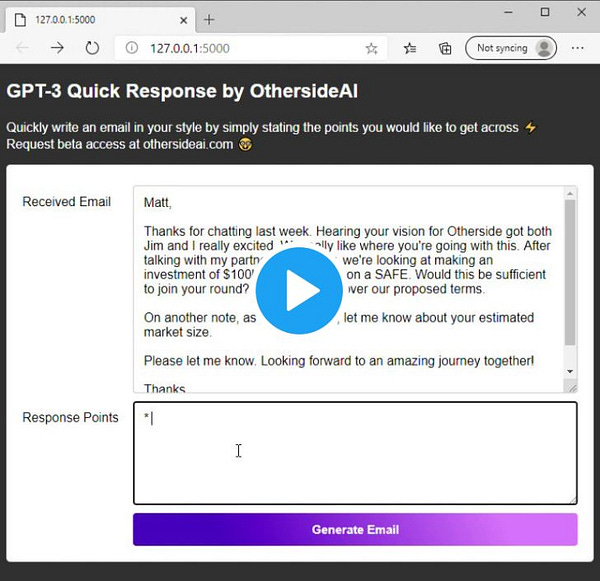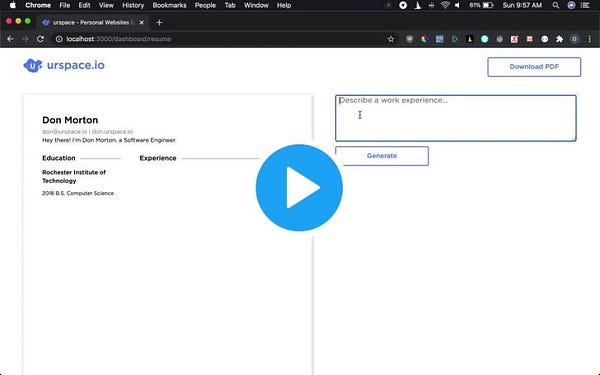Newsletter #28: AI just got smarter
8 minutes reading time. Thoughts on startups, growth, and technology 🚀
Welcome to another edition of the Struggle.
The Struggle is a weekly newsletter where I share my thoughts and learnings from running a fast-growing startup in Southeast Asia.
This week, I will cover a slightly different topic than usual and discuss advances in AI. A few weeks ago, OpenAI released a new artificial intelligence API called GPT-3, and it's a big deal.
If you are not familiar with OpenAI, consider that the company was founded in 2015 by Elon Musk (Tesla, SpaceX), Sam Altman (YCombinator), and a few other leaders in Machine Learning, in order to conduct research in the field of artificial intelligence (AI) and to promote and develop friendly AI in a way that benefits humanity as a whole.
GPT-3 was first described in a research paper published in May, but last week its API was opened to a selected few people as OpenAI wants to understand better what GPT-3 is capable of. If everything goes well, OpenAI plans to turn the tool into a commercial product by the end of the year, allowing businesses to access it via paid subscription.
In a nutshell, GPT-3 is an autocomplete, that can complete entire paragraphs or essays for you in a very human-like way.
Here you go a few examples that caught my eye:
Generating a resume for you
Replying to an email


Writing an essay




Building mini-applications
How smart is GPT-3?
I am not an expert on the topic, but based on my research, GPT-3 does not understand if its output is accurate or not. It analyzes a large sample of text on the internet so that it can predict what words come next in a sentence, considering the prior context. It follows the context you have given to learn and suggest what is statistically most likely to be true. To truly understand its limitations, I advise you to read the following article where GPT-3 is given the Turing test, testing its ability to understand whether it’s an AI or not: http://lacker.io/ai/2020/07/06/giving-gpt-3-a-turing-test.html.


Even one of the co-founders of Open AI, Sal Altman tried to tone things done arguing that the hype is too much and while the tool is impressive it has some serious weaknesses and it makes mistakes.
“AI is going to change the world, but GPT-3 is just a very early glimpse. We have a lot still to figure out.”
Sam Altman, OpenAI Co-Founder
What use cases do we see in business?
My expertise lies mainly in the fields of sales, marketing, and customer experience so let me try to keep it specific to that:
Generating titles for articles
Paraphrasing articles
Generating SEO optimized copy
Generating social media posts
Simple research
Bot-like functionality where it can handle basic requests or FAQs
Personalized sales outreaches
“The optimistic view is that GPT-3 eliminates these things and frees up professionals to focus on more complex and higher impact problems for the org.”
Brian Balfour, Founder and CEO at Reforge
But as with everything else, it is unreasonable to expect it will be all positive. There are definitely concerns about the impact on search engines i.e. SEO and identifying quality content.
Curious to see how OpenAI will monetize it and when GPT-4 will be released.
Resources worth checking out:
📝 Quick thoughts on GPT3 | Delian Asparouhov - My favorite analogy for explaining GPT-3 is that the iPhone put the world’s knowledge into your pocket, but GPT-3 provides 10,000 PhDs that are willing to converse with you on those topics.
30 years ago, Steve Jobs described computers as “bicycles for the mind.” I’d argue that, even in its current form, GPT-3 is “a racecar for the mind.”
📝 OpenAI’s new language generator GPT-3 is shockingly good—and completely mindless | Will Douglas Heaven - The AI is the largest language model ever created and can generate amazing human-like text on demand but won't bring us closer to true intelligence.
📝 The Impact Of GPT-3 | Brian Balfour - Even if it turns out that GPT-3 can't do the above things with decent quality, the message is clear, that AI with the ability to do so is extremely near. What that means for a lot of professionals is that execution starts to get commoditized, the real value will be placed on those who can solve complex problems.
A quote worth remembering:
💬 Inventor and businessman Thomas Edison on focus:
"You do something all day long, don’t you? Every one does. If you get up at seven o’clock and go to bed at eleven, you have put in sixteen good hours, and it is certain with most people, that they have been doing something all the time. They have been either walking, or reading, or writing, or thinking. The only trouble is that they do it about a great many things and I do it about one. If they took the time in question and applied it in one direction, to one object, they would succeed. Success is sure to follow such application. The trouble lies in the fact that people do not have an object, one thing, to which they stick, letting all else go. Success is the product of the severest kind of mental and physical application."
A book recommendation:
📖 How to Make a Spaceship: A Band of Renegades, an Epic Race, and the Birth of Private Spaceflight by Julian Guthrie.
The story of the bullet-shaped SpaceShipOne, and the other teams in the hunt, is an extraordinary tale of making the impossible possible. It is driven by outsized characters—Burt Rutan, Richard Branson, John Carmack, Paul Allen—and obsessive pursuits. In the end, as Diamandis dreamed, the result wasn’t just a victory for one team; it was the foundation for a new industry and a new age.
Positive news worth sharing:

Despite the headlines, fatal accidents involving aircraft are rare. The number of fatal incidents per year is down to single figures. And in 2017, which saw over 33 million passenger flights, it was zero!
GPS technology has revolutionized air traffic control. Critical in-flight systems are protected. Pilots are rigorously trained and retrained again and again. Planes are more robust, and in-flight protocols are improving all the time. Flying is almost risk-free.
Check out the source here.








